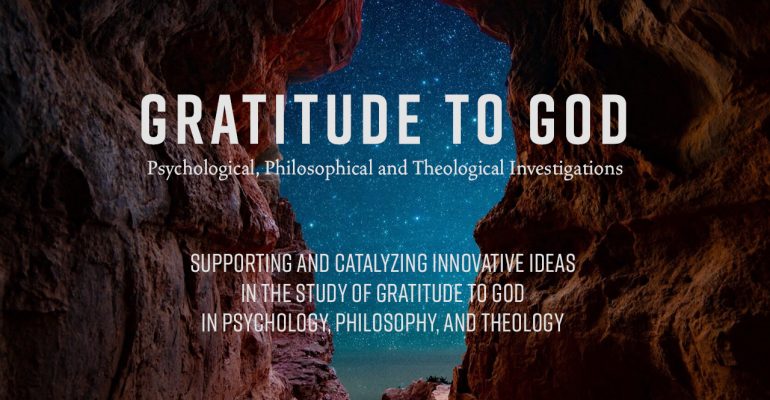Gratitude to God (GTG)
January 30, 2020 2023-05-20 15:45Gratitude to God (GTG)

Gratitude to God (GTG)
Psychological, Philosophical and Theological Investigations
The scientific study of gratitude to God (GTG) has been virtually ignored, despite the fact that gratitude is at the core of religious ritual and belief systems. We will fund empirical and nonempirical projects that investigate the nature of GTG and how it’s different from gratitude to humans.
In a recent survey, of those students who believe in God, fully 100 percent said that God was a major source of benefits in their lives (Scheibe, Watkins, & Uhder, 2017). Yet, psychologists know little about fundamental issues concerning the nature, structure, and function of gratitude to God.
We envision that this project will begin to fill a gap in knowledge about a foundational form of gratitude and will be poised to make a major contribution to the science of gratitude and to the psychology of religion. One long-term impact of this project is that it will establish the foundations and provide the impetus for the study of other emotions that are commonly directed toward God.
Very little research has been reported on gratitude to God, despite the central role that recognizing God’s provision of benefits plays in all major world religions. In contrast, research on gratitude in human social interactions has accelerated in the past decade. Because most people believe in God (Pew Research Center, 2018), investigations into God as a benefactor and gratitude to God as an emotional response to God’s benefaction are needed.
This smattering of findings suggests that gratitude is relevant to religious and spiritual experience for many people. Given the traditional links of gratitude to religion and spirituality, survey data, and the fact that people frequently feel grateful to non-human agents when they receive benefits (e.g., Teigen, 1997), the topic of gratitude to God (GTG) merits further exploration.
The main components of this project are:
1. Four large-scale RFPs for both empirical and nonempirical researchers.
2. A launch conference for project participants that will bring the empirical and conceptual components together in the format of a collaborative workshop in the first year of the project period.
3. A capstone conference near the conclusion of the project that would involve all project participants.
4. An empirical research project of a comparison of gratitude to God (GTG) with gratitude to humans (GTH) involving collaborations between Baylor University; the University of California, Davis; and Biola University.
5. Two special issues of professional journals on the topic of Gratitude to God.
Upcoming Events
Two meetings are planned to stimulate dialogue among grantees, and to communicate insights generated from the projects to a broader audience. The project will include two meetings, scheduled for early December 2020 and October 2022. The first meeting, scheduled for December 2020, is a three-day research workshop designed to allow grantees to present their proposed projects for the purpose of receiving feedback. The second meeting, scheduled in October 2022, is a capstone conference toward the end of the grant period designed for grantees to present their findings to a larger, public audience and to stimulate future collaborative efforts.
Project Leaders
– Peter Hill
Peter C. Hill, Ph.D., is a Professor of Psychology at the Rosemead School of Psychology at Biola University. He is an active researcher in social psychology and the psychology of religion.
– Bob Emmons
Robert A. Emmons, Ph.D. is a Professor of Psychology at the University of California, Davis. His research focuses on the psychology of gratitude and joy as they relate to human flourishing.
Contacts
- Address: Biola University, 13800 Biola Ave, La Mirada, CA 90639, US
- Email: gratitude.to.god@biola.edu
- Website: https://www.gratitudetogod.com/








